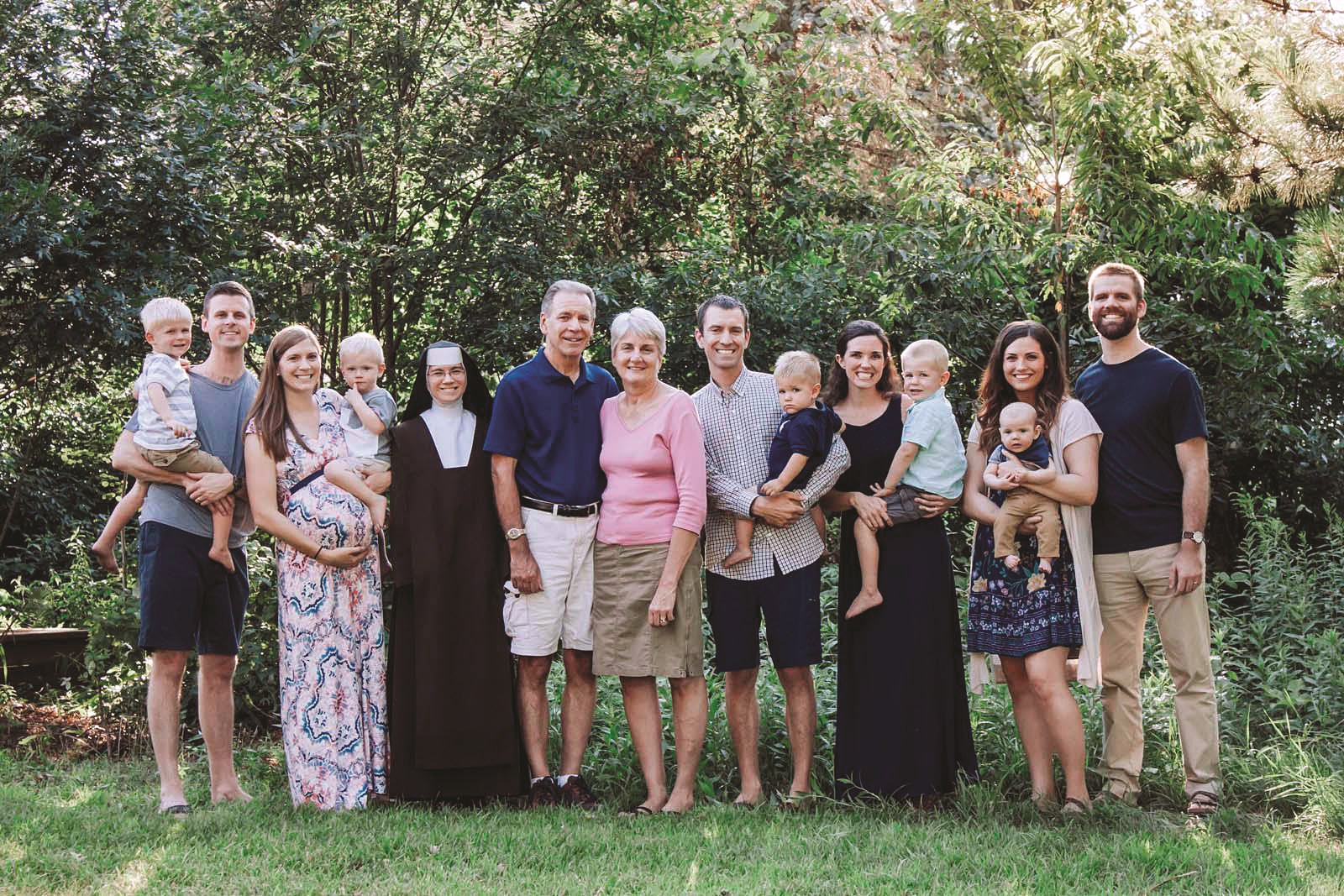This story is featured in the spring 2021 issue of Lumen.
Roger Vasko is a parent of four St. Thomas alumni, three of whom were Catholic studies majors. He knows a thing or two about business – at age 28, he and his brother bought his father’s trash hauling company. Over decades, they grew it substantially into multiple locations across central Minnesota before selling the business and retiring in 2005.
After retiring, in conversations at his parish, Roger noticed a theme of young families struggling financially, especially when it came to affording Catholic education. He also knew there wasn’t a coordinated way to connect job seekers with local businesses that wanted to hire Catholics, or to help customers find Catholic businesses to patronize.
So in 2019, Roger and a team of collaborators – including his son Ben Vasko ’14 – launched a nonprofit organization, the St. Joseph Business Guild.
The guild is open to Catholics in the Archdiocese of Saint Paul and Minneapolis. It includes businesses, individual workers, nonprofits, students and people seeking jobs.
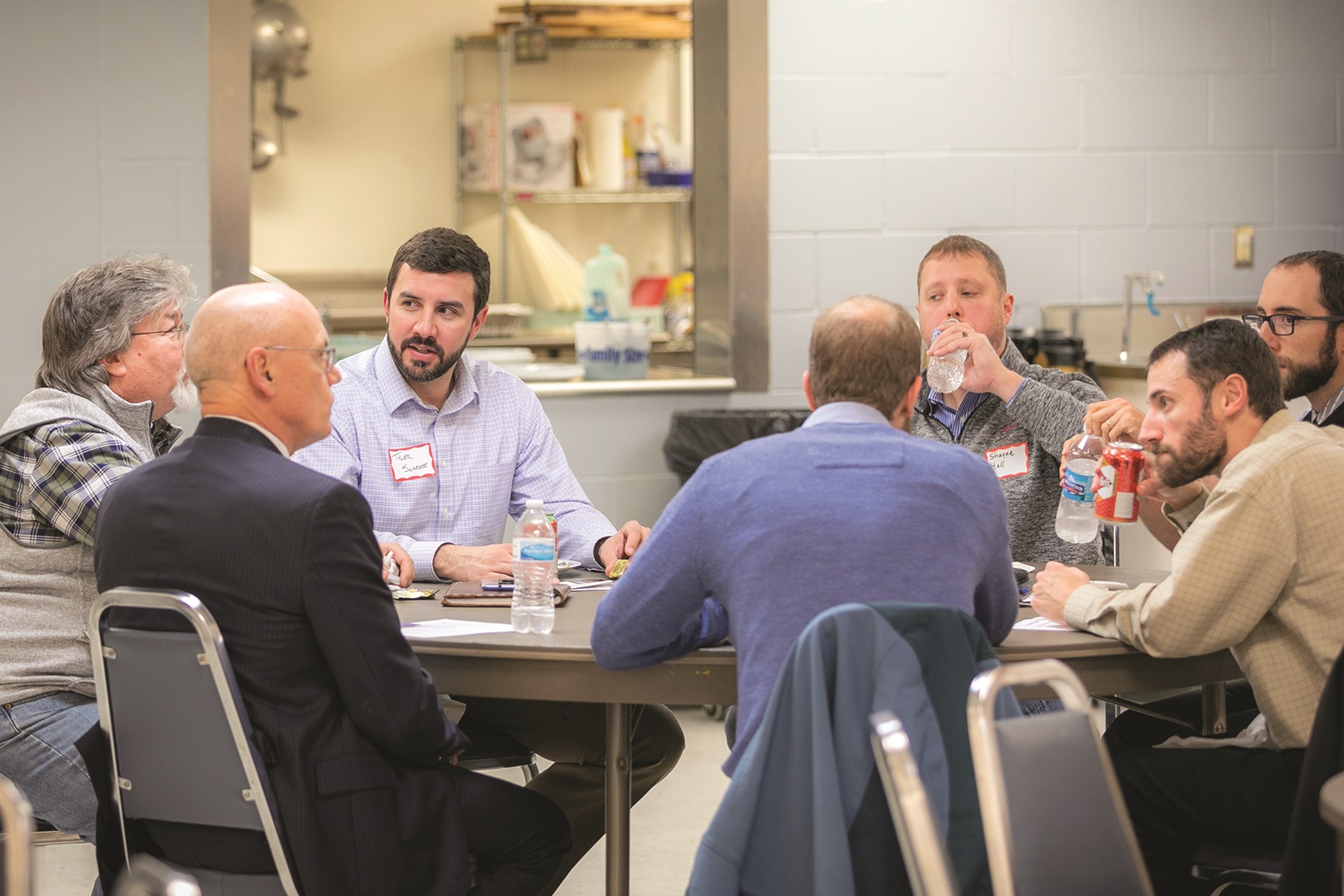 The concept comes from the artisans’ guilds of medieval Europe, groups of local craftsmen who banded together for spiritual and material solidarity. Guilds safeguarded the dignity of work, upholding just wages, ethical working conditions, and fair prices for both sellers and buyers. Apprenticeships allowed trades to be passed down through generations of families in a formative environment.
The concept comes from the artisans’ guilds of medieval Europe, groups of local craftsmen who banded together for spiritual and material solidarity. Guilds safeguarded the dignity of work, upholding just wages, ethical working conditions, and fair prices for both sellers and buyers. Apprenticeships allowed trades to be passed down through generations of families in a formative environment.
In a time before company pensions or state safety nets, the guilds were a way for Catholics to practice the works of mercy for each other and for the poor. Guilds helped members who were unable to work due to sickness or disability and provided support for families of deceased members.
Just as important was spiritual support. Guilds gathered for public expressions of faith, including prayers for their dead and celebrations on their patron saint’s feast day. They might patronize a chapel or contribute to the building of a new church, such as the guild-sponsored stained-glass windows in many medieval cathedrals.
Although the St. Joseph Business Guild isn’t limited to a single trade or profession, it shares the principles of fraternal support and family-centered focus.
“Our ultimate goal is to help Catholics provide for their families,” Roger said. “We want to direct our business and our best jobs to the faithful Catholics who support the parishes and schools.” St. Joseph, saint of families and workers, was an obvious choice for a patron.
Members can access job boards where businesses post positions they’re hiring for, and job seekers post resumes. A member database and quarterly meetings facilitate connections to mentors or networking contacts.
A business directory is available to the public on the guild’s website. It showcases the spectrum of member businesses – manufacturers, mortgage brokers, construction companies, web designers, bakers and more.
Membership is free for students. In the spirit of its medieval counterparts, the guild plans to start offering apprenticeships and internships later this year.
Faithfulness to Catholic teaching is one condition of membership. Also, members are asked to practice relational networking – which the guild’s website describes as “giving without the expectation of receiving in return.”
Roger said, “Because of our common faith, we’re like-minded and motivated to help one another.” He also noted that the element of shared faith “speeds up the whole process” of trusting someone enough to do business with them.
Work in the Catholic tradition
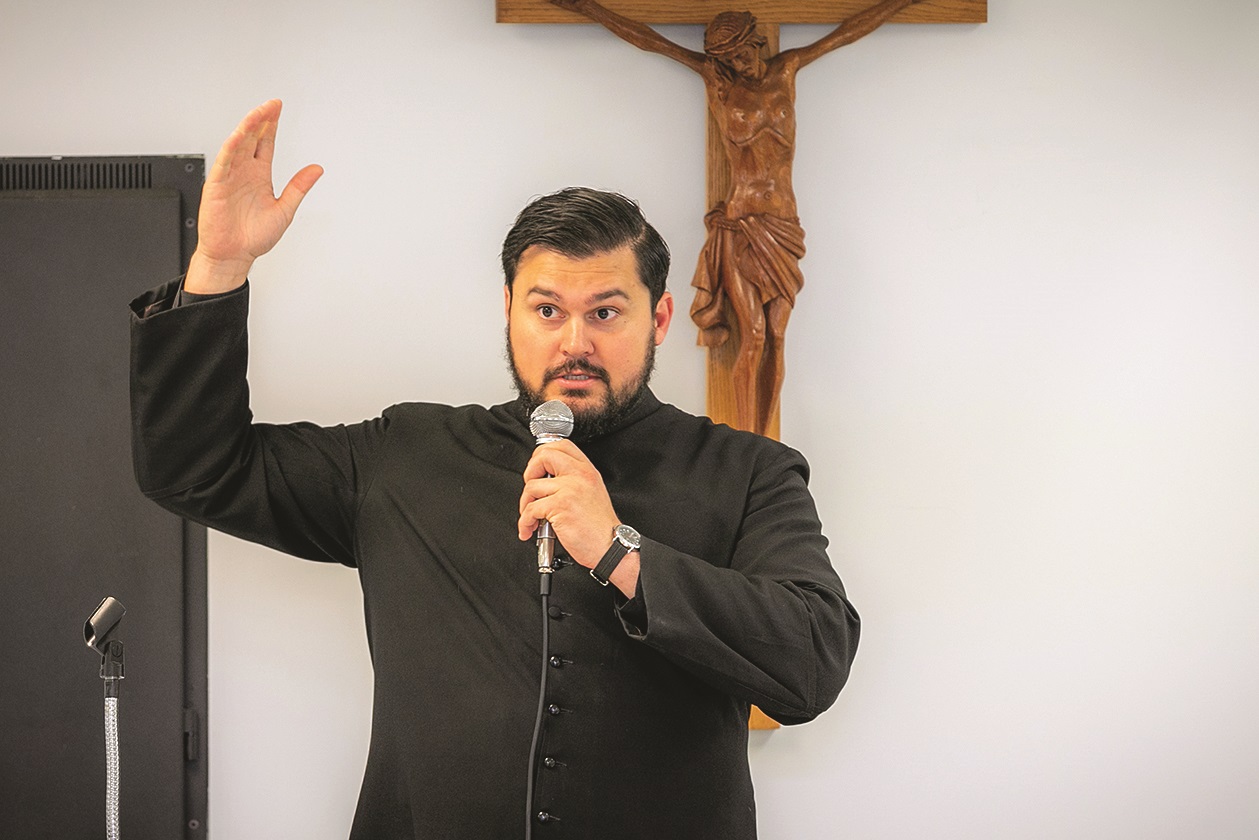
Guild chaplain Father Spencer Howe ’09
The guild’s chaplains, Father Spencer Howe '09 and Father Byron Hagan '12, assist with the spiritual aspects of the guild, including liturgies and retreats. Their parish, Holy Cross Catholic Church in northeast Minneapolis, hosts some of the guild events.
Howe said that “the centrality of the family and the dignity of labor are two of the primary values of what the guild is about.”
He draws a connection between the guild’s support of family-based business and the economic theory of distributism, which is rooted in the principles of the Catholic social tradition: “One of the hallmarks of distributism according to the articulated tradition of Chesterton, Belloc and friends … was the idea of broad distribution of the means of production – effectively to ennoble the family to make it possible for people to create their own wealth as a result of hard work, ingenuity and dedication to a trade.”
Center for Catholic Studies Director Dr. Michael Naughton is on the guild’s advisory board. He sees the guild’s mission as a natural connection for the Catholic studies academic degree program, in which students are encouraged to pair their major with another degree that reflects a career path. For students graduating and moving into the professional world, participation in the common good through business is an important part of their vocation.
“Work does not exhaust a vocation,” Naughton said. “Their first vocation is to be holy. The second vocation is to participate in a state of life: priestly, religious or lay … But they’re also called to work. They’re called to animate the public order, the temporal order that we live in, through the incarnation and through the spirit of Christ in everything they do.”
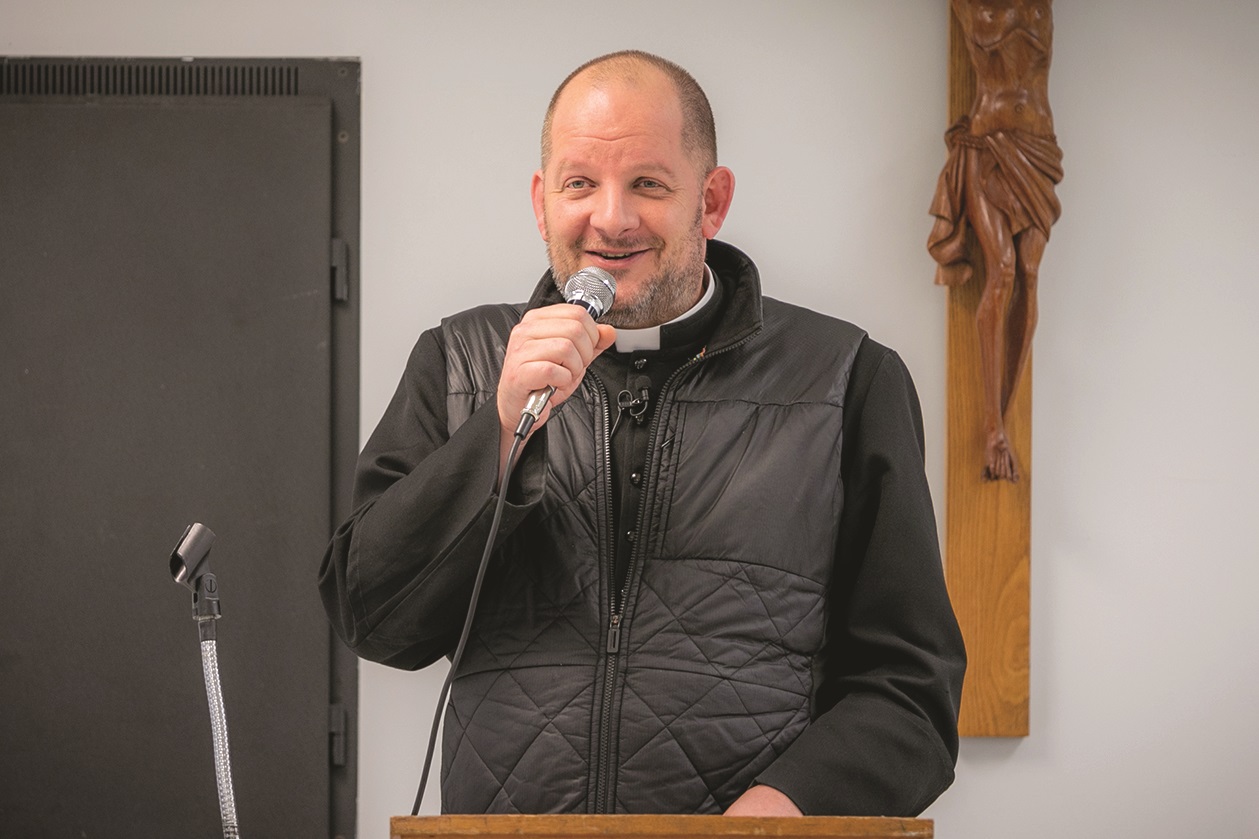
Guild chaplain Father Byron Hagan ’12
He noted that a key aspect of the guild’s mission is that it is an environment where members can integrate faith and work.
"So many of us, we often divide our lives. We have faith over here, and business over here. I think the guild is trying to provide an organic relationship between one’s faith – and the importance of that faith, which has a social dimension to it – and what one does, spends one’s time, in terms of the day-to-day living that you get from business.”
A resource for families
Guild members and 2015 St. Thomas alumni Ben and Katzie Nelson are a husband-wife team with a wedding photography business, Katzie and Ben Photography.

Guild members and 2015 St. Thomas alumni Ben and Katzie Nelson
The two met as Catholic studies undergraduates and started dating after graduation. Katzie, who also works in the St. Thomas IT department, had been a photographer since high school. Ben started helping out at her gigs, and turned out to have a knack of his own with the camera. They joke that as their courtship moved through “relationship promotions,” Ben got “business promotions” – “After we got engaged, I got my name in the business,” Ben said. They now have a young son.
Often clients seek them out specifically because they’re Catholic, knowing Ben and Katzie will understand and highlight what’s truly important about the wedding day. Katzie appreciates being able to suggest the guild as a resource for other wedding services, given that those couples already are looking to do business with fellow Catholics. She hopes the guild connections will provide support not only on the wedding day, but beyond.
That’s certainly been their own family’s experience. “Our realtor is from the guild, our insurance agent is from the guild, we did some photo headshots for one of the guild members and now we’re using them for some financial planning … Now that we’re homeowners too, I have an extra keen eye of wanting to support other Catholic businesses as often as I can.”
A higher standard
Nestor Arguello is a real estate agent, as well as a part-time program coordinator for the Center for Catholic Studies’ Habiger Institute Latino Scholars.
“I love the service that [real estate work] offers,” he said. He’s intentional about getting to know each client well so he can help them make a good decision about buying or selling a home.
As a guild member, he values the expectation of excellence that comes with promoting himself as a Catholic professional. “You’re putting a target on your back,” he said. “To perform at a higher standard of excellence, of professionalism, of faith and understanding.”
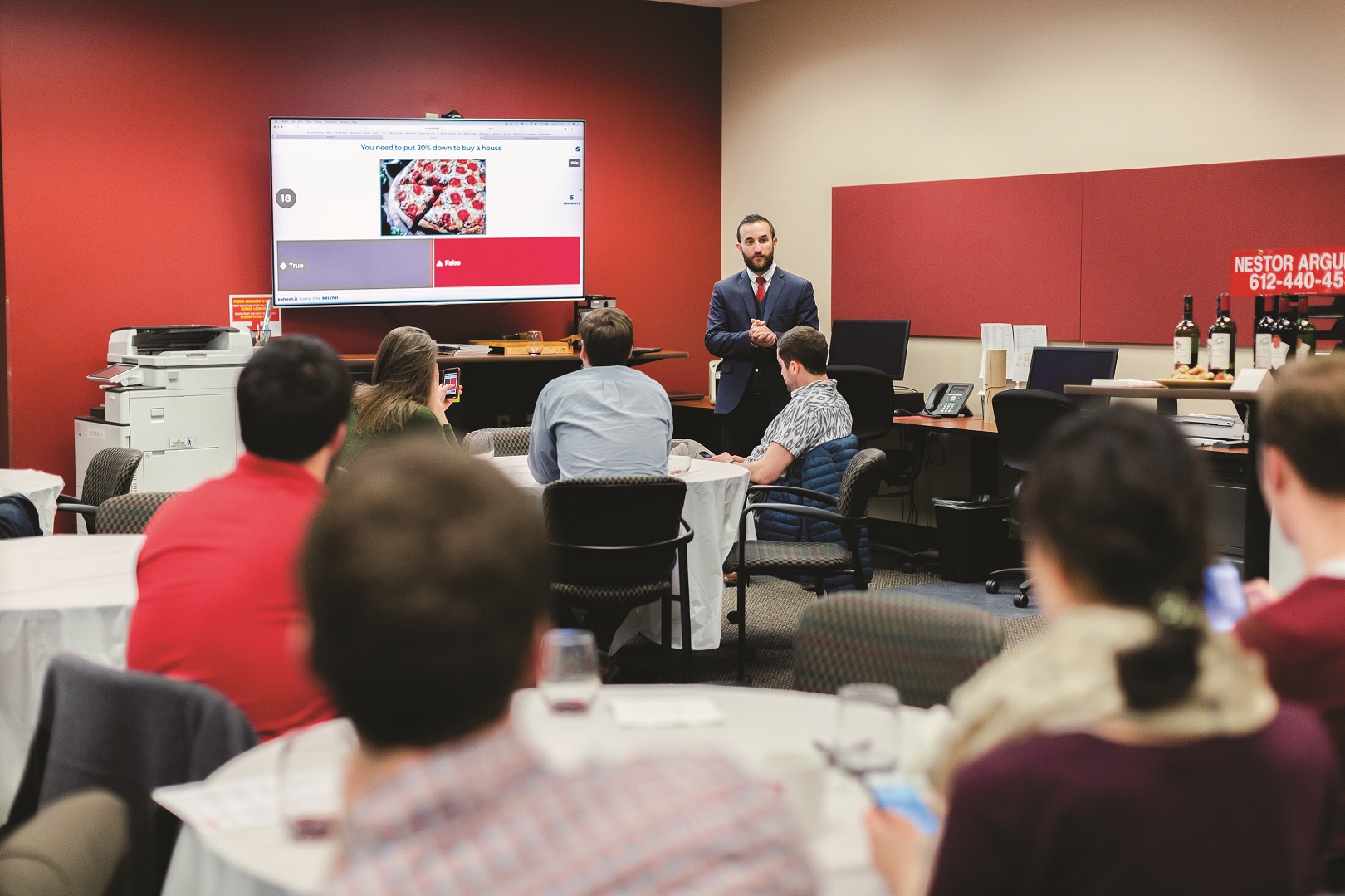
Habiger Institute Latino Scholars program coordinator and real estate agent Nestor Arguello gives a presentation for first-time homebuyers.
He’s had a number of clients who chose him because they wanted a Catholic realtor – which initially surprised him. “I never thought that my clients would think to themselves when looking for a realtor, ‘First I’m looking for a Catholic’ … But it was something that some of my clients have said, ‘I wanted someone who had Catholic values.’ Their assumption is if you’re promoting yourself as a Catholic you are going to be ethical, you’re going to not create loopholes.”
He appreciates the support of a group that holds itself to that standard.
“There’s something spiritual that’s being gained through those meetings, through encountering other businesspeople, even if they are other realtors, people who would be my competition. I appreciate seeing other people who are like-minded who are going to serve people.”
